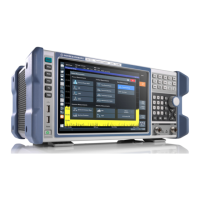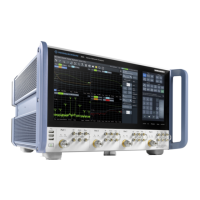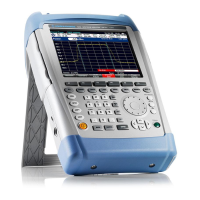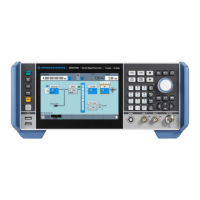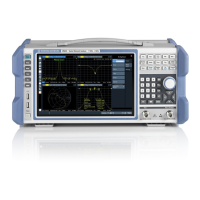R&S FSL Using Markers and Delta Markers – MKR Key
1300.2519.12 4.53 E-11
Using Markers and Delta Markers – MKR Key
The markers are used for marking points on traces, reading out measurement results and for quickly
selecting a display section. The R&S FSL provides four markers per trace.
M1
D2
M3
T1
Marker
Delta marker
Active marker Temporary marker
Fig. 4-5: Marker types
All markers can be used either as markers or delta markers. The marker that can be moved by the user
is defined in the following as the active marker. Temporary markers are used in addition to the markers
and delta markers to evaluate the measurement results. They disappear when the associated function
is deactivated.
The measurement results of the active marker (also called marker values) are displayed in the marker
field. The marker field is located at the upper right corner of the display and shows the following:
• marker type (M1 in the example)
• trace in square brackets ([1] in the example)
• level (–33.09 dBm in the example)
• marker location (3 GHz in the example)
Fig. 4-6: Marker values
The MKR key is used to select and position the absolute and relative measurement markers (markers
and delta markers). In addition, the functions for frequency counter, fixed reference point for relative
measurement markers and enlargement of the measurement area are assigned to this key.
Also the following measurements can be carried out:
• Noise density (Noise Meas On/Off softkey; see also "Measurement of noise density" on page 4.56)
• Frequency measurement (Sig Count On/Off softkey; see also "Frequency measurement with the
frequency counter" on page 4.56)
• Filter or signal bandwidth (n dB down softkey)
• AF demodulation (Marker Demod softkey; see also "AF demodulation" on page 4.56)
For further information on markers see also "Changing Settings via Markers – MKR–> Key" on page
4.66.
To open the marker menu
Press the MKR key.
The marker menu is displayed. If no marker is active, marker 1 is activated and a peak search on
the trace is carried out. Otherwise, the edit dialog box for the last activated marker is opened and
the current frequency / time value is displayed.
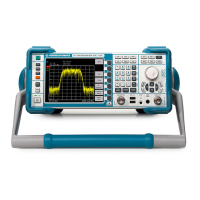
